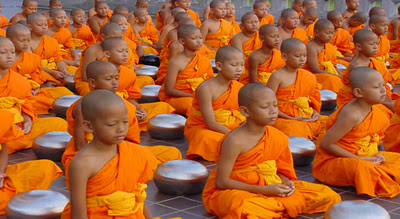Wherever You Go, There You Are
08/11/2012 21:32
We have arrived at Samahita retreats. Stephen meets me at the front desk for a brief tour of what he calls “your home for the next month”. We stop at the Ganesha shala and he instructs me on how we are going to be working together on this teacher training. Among other things, he explains to me I am going to be in charge of closing the shala after everyone leaves. “Paul is very particular about how the room is closed, about what incense is lit and so on. Elonne will instrunct you”, he says. I can't help laughing out loud. It is no coincidence that these chores are falling to me.
Let me digress for a moment. I recently lost one of my yoga gigs at a studio where I had been teaching only a few months. When asked for a reason, the owner told me she didn't appreciate how I was not mindful around the studio, that I hadn't washed the tea cups a few times etc.
I remember when I started there, I was meticulously instructed on how the studio was to be cleaned and tidied up. When I saw the long list of chores, truth be told, my instinctive reaction was: “Oh, come on...”. (Rolling my eyes on the inside). Now, while I am certainly reliable and precise, I am not obsessive about how i keep my things. Even as I child, I was always the one that couldn't keep her books from getting dog-ears and her clean sweater from getting stained. I try when I have to, but sometimes I just can't be bothered. And yes, even though that may not be a reason to take a class off the schedule, it is not very mindful of me. And more importantly, it is not necessarily respectful and compassionate towards others.
Is it the first time I hear this criticism? Of course not. I've been in very similar situations before. So how long can you pretend it's other people's problem and not yours?
I distinctly remember being in a workshop with Ross Rayburn once, when he said: “Life is going to present you with the same physical injury, the same stupid boyfriend, the same issues at work... until you finally realize you need to take a look at your pattern.” For me personally, this is the biggest life-changing lesson yoga has taught me, to this day: It's not them, it's you.
How easy and much more convenient would it be to just dismiss my ex-boss at the yoga studio as a compulsive cleaner and make a few sarcastic jokes about the whole story? But wherever you go, there you are: I have just gotten here and already I am presented with yet another opportunity to clean. And this time, I do not think “Oh come on...” (and I don't even roll my eyes on the inside). This time I realize this is my chance to change the pattern. This time, I will take it seriously, do it as a devotional practice and as a service to others. Without thinking I have to hurry to get on, to get out, and already be some place else.
Like Stephen said in his opening speech tonight: Trust that the teaching is in what presents itself right in front of you. The teaching is everywhere around you, what we call, the Guru Sakshat. This is actually my all-time favorite quote from Stephen's manual (p. 5):
“We are always given exactly what we can handle to grow. Trust that what keeps appearing in front of you as an obstacle is the very thing that can liberate you.” Like Stephen said earlier today, it is hard to jump without the ground to push off from. So often we need something to push against in order to grow, or even just in order to understand.
Funny though, how we trust a formal teacher to guide us even though we might only have known him a few years. Life has been with us since day one – why don't we trust life lessons the same way?
If you can see beyond the formal training, this is also one of the many things happening on a teacher training. There will be moments when you get frustrated and you feel you've been going in circles. There will be times when other people push your buttons here, just like everywhere else you go. Guru Sakshat all around. And then it is up to us... We will stand at the exact same crossroads between habitual reations and actually seeing beyond them. And maybe... maybe this time, we will decide not to go down that same old road.
PS: This is what happens when you stop opposing resistance to life's teaching: Turns out “closing the space” is nothing more than lighting 7 incense sticks and placing them on different altars while reciting a mantra. (And checking doors and props).

